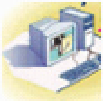Global Positioning System Reference
In-Depth Information
,
δ∆r
L
δ∆r
δ∆r
L
(5)
5. Summary of network RTK processing techniques
In this section, the most common network RTK techniques used at present are discussed,
namely: the VRS, FKP, and Mac.
5.1 The Virtual Reference Station (VRS) method
The VRS technique is currently the most popular NRTK method due to the fact that it does
not require changes in the user software, i.e. it is compatible with existing software. The
rover applies the standard differential positioning of its observations with observations
from a 'virtual' reference station. The distance-dependent errors are computed for each pair
of satellites, and for each master-to-another-reference station. The VRS method requires bi-
directional communication. The rover sends its approximate position via a wireless
communication link (typically a cellular modem in NMEA format) to the network
processing centre where computations are carried out for each user (Vollath
et al
., 2000, Hu
et al
., 2003). Some network providers use only the nearest three-to-five reference stations to
compute the measurement errors for a specific user, see Figure 2. The estimated network
measurement distance-dependent errors are interpolated for a virtual reference station
(VRS). The VRS location is typically selected at the initial approximate position of the rover.
For a kinematic user, this VRS location is kept to preserve the ambiguity values determined
from its solution until the range between the VRS and the actual position of the rover
becomes too long for precise differential positioning. Then, a new VRS at the most recent
position of the user is established.
ref st.
VRS
i
rover
ref st.
j
ref st.
NRTK
centre
Fig. 2. VRS concept
To construct the observations at the VRS, the VRS and the satellite known positions are
firstly used to compute the range between the satellite and the VRS. Similarly, the range
between the satellite and the master station is computed, where the master station is usually













Search WWH ::

Custom Search